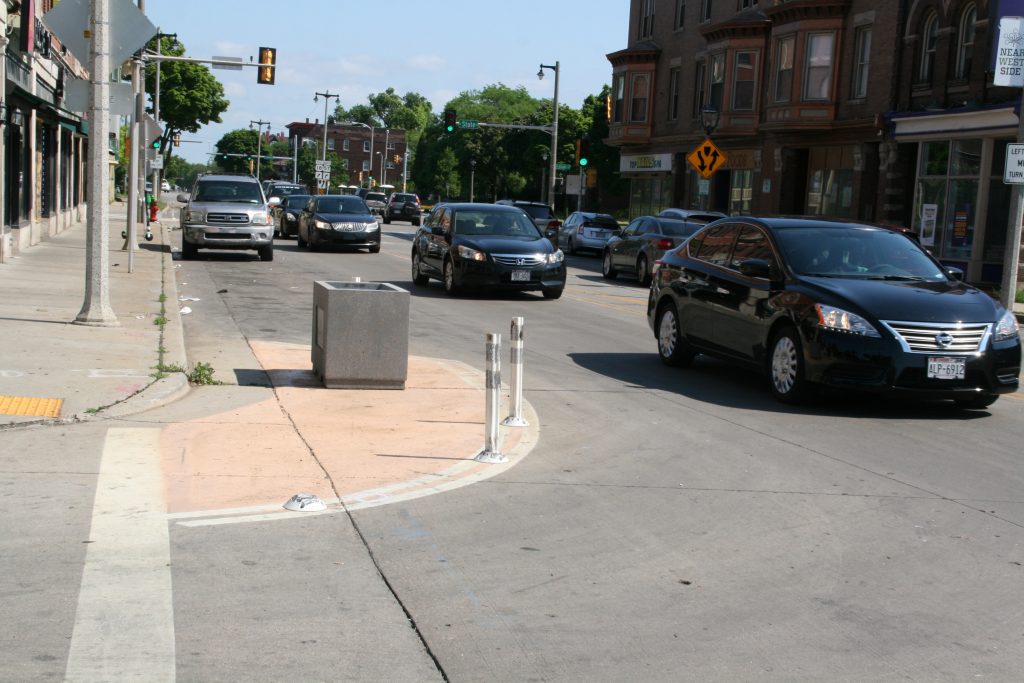The Greening of Concrete
All the city news you can use.
Every day at The Overhead Wire we sort through over 1,500 news items about cities and share the best ones with our email list. Each week, we take some of the most popular stories and share them with Urban Milwaukee readers. They are national (or international) links, sometimes entertaining and sometimes absurd, but hopefully useful.
A car free congress avenue: A proposal to make sections of Congress Avenue in Austin car free has been released to the public. The first segment of the $130m project sourced from a 2020 transportation bond measure would take a section between 9th and 11th streets and open it up to walking, biking, and dining. Construction on the first phase could start in 2025. (Mason Rouser | KUT)
High speed rail for Canada: In the coming weeks, the Canadian government will announce plans for a high speed rail line between Toronto and Quebec City. The 300km/hr train would take travelers between Montreal and Toronto in three hours, a trip which takes 5.5 hours in a car today. While the price tag is currently unknown or speculated on, it will take four to five years to design the system before construction. (Thomas Gerbet, Louis Blouin, and Mathieu Prost | CBC News)
Greening concrete: To create cement for concrete, limestone is mined, ground up, and baked at 1500 degrees Celsius usually using fossil fuels. Cement is the binder that when mixed with a specific kind of sand and gravel and water creates concrete we use for buildings, roads, and infrastructure. But as climate change bears down, companies are looking for ways to make the process greener either through the heating process or by capturing emissions at creation of cement and storing it underground. (Christian Schwägerl | Yale e360)
Missoula housing park goes co-op: In Missoula Montana residents of a manufactured housing park were able to purchase their property and set it up as a resident owned cooperative. They were helped by NeighborhWorks Montana which did some of the heavy lifting including price negotiations and review the new bylaws. Now their rents will go to community maintenance and upgrades instead of to a landlord. (Katie Fairbanks | Missoula Free Press)
Radical contract protecting Hamburg’s green spaces: Nature reserves make up 10% of Hamburg’s land, more than any other state in Germany. And the preservation of green space will continue as a contract was signed in 2019 between city officials and a citizen’s initiative that would protect 30% of the land area. This contract has provisions for offsetting damages from development, making sure that existing areas are developed more intensely, and improving natural impacts of the preserved areas. (Ajit Niranjan | The Guardian)
Quote of the Week
I love the optimism of competition. But sometimes it’s so much energy that design practices put in and then don’t really get materialized. We were drawn to this one because of its call to be built and to make a difference at the city scale; the city that was making the call, rather than a private institution, which I think is a little bit different.
–Chana Haouzi, founder of Architecture for Public Benefit, discussing in Dwell Magazine the disappointment of another architecture competition that hasn’t resulted in actual buildings.
This week on the Talking Headways podcast, we’re joined by Cameron Mays, lead singer of the Transit Themed band The Frans. We chat about transit in Cleveland, the song writing process for transit music, and the parking lot in Erie Pennsylvania that inspired him.
Want more links to read? Visit The Overhead Wire and signup.
If you think stories like this are important, become a member of Urban Milwaukee and help support real, independent journalism. Plus you get some cool added benefits.
Urban Reads
-
Congestion Pricing Cuts Air Pollution in New York City
 Dec 14th, 2025 by Jeff Wood
Dec 14th, 2025 by Jeff Wood
-
We Think We Love to Drive. But Do We Really?
 Dec 7th, 2025 by Jeff Wood
Dec 7th, 2025 by Jeff Wood
-
Can Scott Wiener Tackle America’s Housing Crisis?
 Nov 23rd, 2025 by Jeff Wood
Nov 23rd, 2025 by Jeff Wood





















